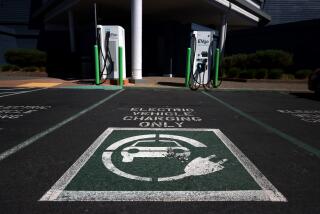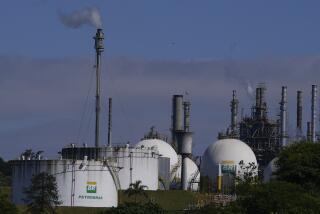Automakers Vow to Unite on Clean Diesel
- Share via
Chief executives of the world’s major automakers pledged Friday to work together for global standards on car safety and environmental regulations with an aim to reduce emissions and cut costs.
In a joint statement issued after a meeting at the Paris auto show, 13 auto industry CEOs said they would work together on three main issues: international standardization of vehicle regulations, worldwide acceptance of clean diesel technology and the promotion of advanced technology and improved fuel quality.
It was a rare expression of unity in a fiercely competitive business in which car companies battle their rivals for every point of market share. Attending the meeting were the heads of BMW, DaimlerChrysler, Fiat Auto, Ford Motor Co., General Motors Corp., PSA Peugeot Citroen, Porsche, Renault, Volkswagen, Honda Motor Co., Toyota Motor Corp., Nissan Motor Co. and Mazda Motor Corp.
A key goal is a universal standard for and acceptance of clean diesel fuel for passenger vehicles. But that could be a tough sell in the U.S. and particularly in California, which has the toughest clean fuel standards in the world.
Although diesel engines already are widely used in passenger vehicles in Europe and Asia, the cleanest versions are still thought to be too dirty for jurisdictions, such as California, with severe smog.
The automakers contend that permitting use of the so-called clean diesel technologies would lead to improved fuel economy and thus reduced emissions of the environmentally damaging greenhouse gases, such as carbon dioxide, that are produced as fuel is burned in internal combustion engines.
“Current diesel engines are dramatically more efficient than conventional gasoline engines in terms of both fuel economy and carbon dioxide emissions. Diesel engines also have the potential to meet stringent requirements regarding local emissions,” the CEOs said in their statement.
California regulators disagree.
“The nitrogen oxide limits in our 2004 emission standards are so tight that we haven’t seen any diesel-powered production vehicle that can meet them,” said Rich Varenchik, spokesman for the California Air Resources Board. “The automakers have always told us our 2004 standards are too difficult for a diesel vehicle to meet.”
European governments, he said, “seem willing to trade some air quality for fuel economy, but in California we simply cannot afford to do that.”
Some environmentalists were heartened by the automakers’ apparent willingness to work together but cautious about celebrating too soon.
“This is very positive, and if we really can get a majority of auto industry leaders working together to improve safety and environmental standards around the world, it should be supported,” said Tim Carmichael, director for Los Angeles-based Coalition Clean Air.
But Carmichael said clean diesel technologies still have not been proved.
It would be more heartening, he said, if the auto executives had issued a call to come together and work toward producing a commercially viable fleet of zero-emissions vehicles over the next decade or so. “That would get us a lot faster to where we believe the industry should be,” Carmichael said.
*
Reuters was used in compiling this report.






